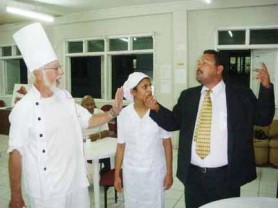By Andre Haynes
Gem Madhoo-Nascimento’s latest production, Murder at Guiseppe’s, attempts to serve up a comic take on the murder mystery, but the offerings are at best tragic and indigestible.

The play was a Rotary Club of Georgetown fundraising project staged at the National Cultural Centre on Wednesday. It centres on the murder of the titular bistro’s landlord Tony (played by Nazim Hussain) and the possible motives behind it. The suspects include an estranged wife, Jess (Dimple Mendonca); a conniving mother-in-law, Jewel (Dr Derry Harry); a new mistress, Sonia (Preya Singh); a neglected son, Anthony (Hashim Alli) as well as the restaurateur Jay (Derek Gomes) and his disgruntled staff (Kit Nascimento and Shameeza Hussain). A mistreated diner (Laurie Lewis) and a frantic reporter (Bernadette Yassin) round out the cast of characters who are present when the murder occurs.
Everyone is destined for an ill-fated evening at Guiseppe’s, an Italian eatery located in downtown Georgetown. And if the idea of an Italian bistro seems a stretch, consider the fact that it also serves as a kind of cultural paradiso, what with artists and musicians on hand as patrons invariably break out into song and dance. Unfortunately, it is there that Tony, a wealthy gold dealer, who appears to be on the verge of a divorce, is dining with his new mistress. His wife and expert mother-in-law, who are considering “taking him to the cleaners,” also happen to be on hand. Tony’s luck worsens with the sudden appearance of a young man who claims to be his son. It makes for an uncomfortable dining experience for all and in particular the nervous host and his hapless staff.
There are all the ingredients there for a delectable dish but sadly the results suggest the need for greater care in preparation. In fairness to the actors and their theatrical prowess (Gomes, who holds up well under the weight of a bad accent– or even the lack thereof; Nascimento, who has never been more wrong) the script offers up stock roles and a clichéd plot that hardly bothers to include coherence in the recipe as it races to an abrupt climax. Hussain, an able stage veteran, seems bored with his character, a joyless Casanova with questionable taste as far as dining locations go and a very short temper. Mendonca, on the other hand, tries to make the best of her role, the incidentally ironic gold-digging wife. What motivates any of the other characters appears to be also part of the mystery of the play: Lewis’ frustrated diner– a doctor we are told –never gets any service but never considers leaving; the motive of the mistress, who has a penchant for malapropisms, is wildly inconsistent; and there’s never any real explanation for Yassin’s character.
The comedy is feeble, reaching for relevance while largely steering clear of controversial subjects that receive only the slightest of references. Even the mention of the unsolved murder of Monica Reece in the presence of the former police commissioner is routine. The real problem, however, lies in the fact that the play has nothing to say about anything; nothing about pride; nothing about greed; nothing about fidelity or responsibility or even the class differences that it teases ever so briefly for a quick laugh. At Guiseppe’s, causality is nothing more than a convenient afterthought, and murder, it seems, is an appetiser for meaningless. With writing credits shared by Pradeep Samtani, Satiesh Persaud and Madhoo-Nascimento herself, one wonders whether there weren’t too many cooks in the kitchen.




